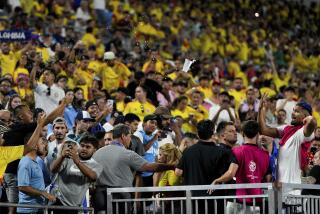After First Week, World Cup Seems a Little Tarnished
- Share via
MEXICO CITY — The World Cup, one of sport’s longest marathons, limped to its half-way mark today with the art of soccer struggling to survive against violence on and off the field.
The 52-game tournament, spread out over a month, has seen rioting in the streets of Mexico City, drunken antics by English supporters, a plunging peso, poor crowds, and anti-government outbursts by Mexicans.
Police said Monday they arrested 68 people after Mexico’s weekend 1-1 draw with Paraguay. The arrests were for minor offenses and were made to remind fans that fun had its limits, a police spokesman said.
Street celebrations in the capital were restrained compared with the fiesta that turned into a riot and injured 200 people after Mexico won its opening game last Tuesday.
In the northern city of Monterrey, where up to 4,000 English fans have assembled to watch their team, police detained 19 supporters over the weekend.
Most were held for 36 hours for minor offenses involving “scandalous or immoral acts in public” and then released Monday, British consular officials said.
About 500 English fans fled the dry inland heat of Monterrey for the beach resort of Acapulco, to raise their spirits before England’s next and probably final game.
Lovers of the world’s most popular sport said they were more distressed by the callous and often violent play favored by many of the 24 teams taking part.
Denmark restored some faith Sunday by demolishing Uruguay with the most skillful and entertaining football seen so far in the finals. But the Danish team paid a price when a savage, unpunished foul put one of its players in the hospital.
“We have urged the referees to stop the violence . . . but we feel sad,” Danish Coach Sepp Piontek said. For Uruguay’s coach, Omar Borras, it was just an “unfortunate accident.”
Uruguay’s Miguel Bossio was sent off in the same match--the fourth expulsion so far in the Mexico World Cup and four more than at the same stage in Spain in 1982.
The matches so far have attracted poor crowds, apart from at the Aztec Stadium where organizers say Mexico’s games were watched by more than the official capacity of 110,000.
Only 11,200 people turned up at Toluca Sunday for an unappealing encounter between Paraguay and Iraq--which produced one expulsion and six cautions--and only 9,000 watch the Soviet Union play Canada on Monday at Irapuato.
Such is the accent on security, particularly surrounding the Iraqis, that organizers said there were 4,000 policemen and soldiers at the match, or one for every three spectators.
Security is even tighter at night in the center of Mexico City, following last week’s trouble. The Independence Monument, focus of celebrations that turned nasty, has been sealed off and authorities are trying to repair damage.
The peso has taken a hammering, falling below 800 to the dollar in black market trading over the weekend. It was 520 at the start of last week.
The happiest people in Mexico were foreign television and radio crews who have finally received the technical facilities they paid for months ago.
Last week, the union of European stations called this World Cup the “biggest disaster in the history of sports broadcasting.” Last night their spokesman, Jarle Hoeysaeter, told Reuters that most technical problems had been sorted out, and added:
“At last everybody’s pulling at the same end of the rope. Things are now the way they should have been several days before the competition started.”
More to Read
Sign up for Essential California
The most important California stories and recommendations in your inbox every morning.
You may occasionally receive promotional content from the Los Angeles Times.













